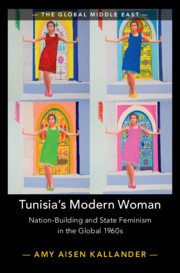Crossref Citations
This Book has been
cited by the following publications. This list is generated based on data provided by Crossref.
Youssef, Maro
2022.
Strategic Choices: How Conservative Women Activists Remained Active throughout Tunisia's Democratic Transition.
Sociological Forum,
Vol. 37,
Issue. 3,
p.
836.
Therrien, Catherine
and
Phipps, Catherine
2023.
Persistent Gender and Racial Hierarchies: Marriage Migration and Mixedness in Morocco from the French Protectorate to the Present.
L'Année du Maghreb,
Vol. 29,
Issue. ,
p.
63.
Keller, Florian
2024.
Postcolonialism and Social Theory in Arabic.
p.
47.
Francis, Ben
2024.
Be a man: A theory of climate change, masculinities and violence.
Environment and Security,
Vol. 2,
Issue. 1,
p.
121.
Pesquet, Laure
2024.
La fabrique du genre et de la famille en Égypte, en Turquie et dans le monde arabe à l’époque contemporaine.
Annales de démographie historique,
Vol. n° 147,
Issue. 1,
p.
5.
Murphy, Emma C.
Han, Saerom
Keskes, Hanen
and
Porter, Gina
2024.
Driven out: women’s employment, the transport sector and social reproduction in Grand Tunis.
Journal of Gender Studies,
Vol. 33,
Issue. 3,
p.
341.
El Kébir, Mehdi
and
Ghédira, Aymen
2024.
Women’s urban mobility in Tunisian Sahel : Analysis on local and regional scales.
p.
1.
Labib, Malak
2024.
Travail industriel et fabrique du genre dans l’Égypte nassérienne.
Annales de démographie historique,
Vol. n° 147,
Issue. 1,
p.
85.
Bonfiglioli, Chiara
and
Fidelis, Malgorzata
2025.
Introduction: recovering the forgotten left feminist networks.
The Global Sixties,
Vol. 18,
Issue. 1,
p.
92.
Iommi, Lucrecia García
2025.
Contestation in Prism.
p.
143.
Malachowski, Justin
2025.
My Cigarette Wife and Other Queer Tales of Kinship from Tunisia’s Contemporary Public Art Scene.
Journal of Contemporary Ethnography,
Vol. 54,
Issue. 1,
p.
30.
Baldinetti, Anna
and
Biondi, Martina
2025.
Unfolding Transnational Female Networks: Algeria, Libya, Morocco, and Tunisia’s delegates at the first Afro-Asian Women’s Conference (1961).
Journal of Asian and African Studies,
Vol. 60,
Issue. 2,
p.
895.



